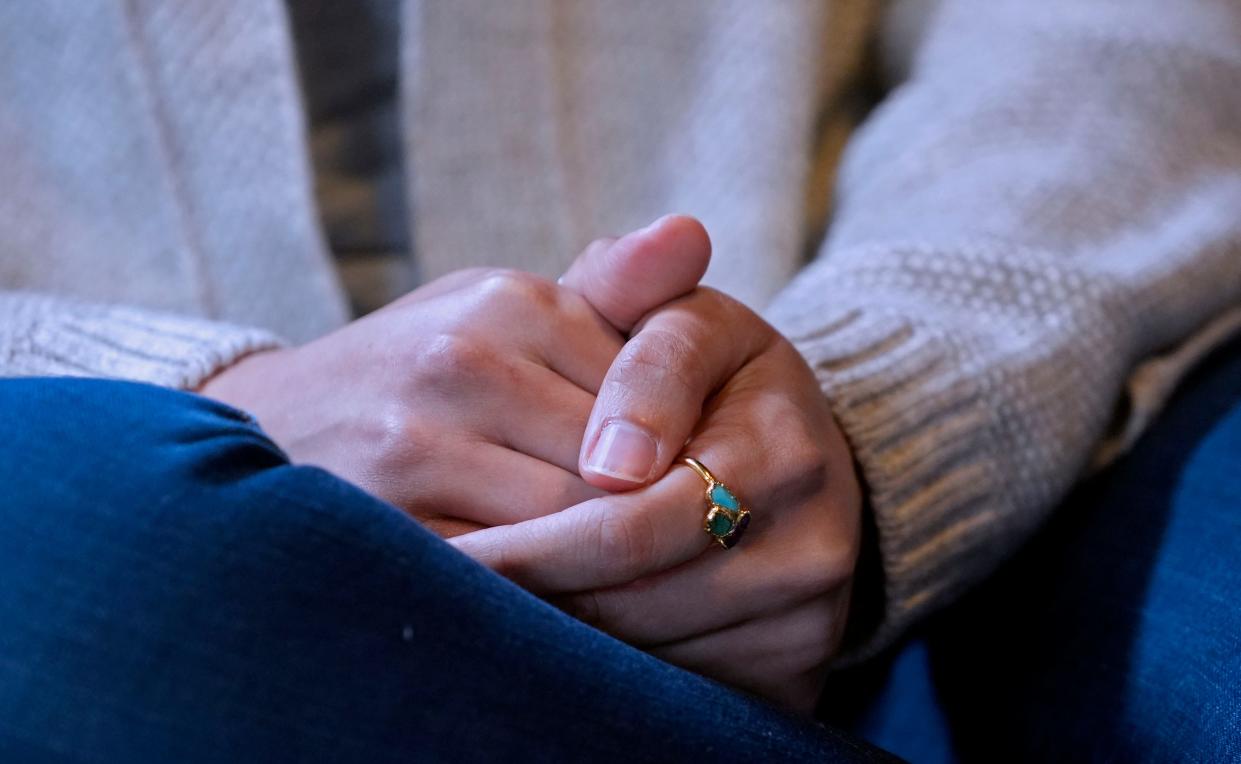Stalked and terrified, she turned to the justice system. What happened left her feeling more unsafe.

Calani celebrated the day she bought a house in a Milwaukee suburb, thinking of the stability it would provide her children after years of moving.
Now her home feels like a prison.
Calani, a single parent of three, was stalked by an ex-boyfriend — the father of her youngest child — for more than a year.
The harassment changed her life. She installed security cameras and automatic lights. She hid weapons around her house and filed police reports. She filed for restraining orders, securing a four-year order of protection for herself and a 10-year order for each of her children.
She even took the step of legally changing her name, hoping for a sense of normalcy in the future. The Journal Sentinel is using her middle name because of safety and privacy concerns.
The harassment stopped after a criminal court case, but if anything, Calani feels more at risk. Not hearing from him means she no longer has a sense of his mental state or habits. She is constantly vigilant and worried he could show up at any time.
“It’s not our home anymore,” she said. “You never feel safe."
Stalking is a common, but often under-discussed form of domestic abuse. One in three women and one in six men have reported experiencing stalking, according to national surveys of crime victims.
Stalking has been hard to prosecute, especially if it primarily consists of repeated online contacts — an issue addressed in a recent U.S. Supreme Court decision. It also has become easier with technology, including location-tracking devices, advocates say.
In Calani's case, her ex-boyfriend used spoofing services to call and text from dozens of unknown numbers, at times making her phone virtually unusable. He showed up at her house repeatedly and asked her friends to get her messages, claiming concern about her or their daughter.
Some of those encounters ended with him shoving Calani, grabbing their daughter and an attempted sexual assault, according to police records.
Calani wants to share her experience so others understand the challenges facing victims, from personal safety to a criminal justice system she says failed her.
"The whole system is supposed to be designed to protect victims," she said. "And it doesn't."
Calls, texts and emails at all hours
One weekend in December 2020, a South Milwaukee police officer called Calani. Her ex-boyfriend was sleeping in his truck outside of her home.
She was out of town, celebrating her birthday. When she explained he was her ex, the officer suggested she get a restraining order.
That was not an option, she said. The man had repeatedly threatened to kill himself if she took such action. The Journal Sentinel is not naming the man to avoid indirectly identifying the victim in this case. His attorney declined to comment because he had not received permission from his client to do so.
The two had met through family connections years earlier. Their relationship lasted about two years. The man's addiction and mental health issues — documented in police reports, including an emergency hold for suicidal threats — were factors in the relationship ending.
After the officer's call, Calani returned home and agreed to let her ex stay at her house for two weeks, enough time to find more permanent housing.
In February 2021, she called 911, saying he had held her down, berated her and threw a remote against a wall. South Milwaukee officers arrested him, triggering a 72-hour no-contact order.
He broke it within 24 hours by leaving her a long voicemail and was arrested, again.
After that, he started circling the neighborhood in different cars. He identified himself as her husband to her neighbors.
The calls, texts and emails came at all hours, and not just to Calani.
He also contacted her friends and family, telling them she was abusive and claiming she had stolen his money.
“Nobody believed him,” she said, “but everyone was sick of it.”
Stalkers know their victims' vulnerabilities and take advantage of them 24/7
Stalking is one kind of abusive behavior that can be particularly hard to stop.
"For most human beings, behaviors are often reinforced when we get what we want, right?" said Michelle Coppens, who works with high-risk domestic violence victims at Sojourner Family Peace Center.
"If I find it's relatively easy to follow this person or get the information I'm looking for, it sort of reinforces that behavior," she said.
If victims choose to go to law enforcement, criminal cases take time to build. Authorities must show a pattern of behavior. It could take weeks or months to receive records from cellphone or social media companies to verify who is sending messages. Throughout that time, a victim is subjected to continued harassment.
"Imagine I know everything there is to know about you and your vulnerability and the vulnerabilities in your environment," said Carmen Pitre, president and chief executive of Sojourner Family Peace Center.
"Stalking is the one place where I could take advantage clearly of all of those vulnerabilities in some subtle and severe ways," she added. "And the system we have is not designed to keep you safe 24 hours a day."
Advocates say they've had success with victims installing security cameras and alarm systems, and varying their routines. But if someone has children, particularly children in common with that person, they may not be able to switch the times for school drop-off, for example.
Many parents who are victims make decisions to prioritize their own child's safety rather than their own, she said. A victim who fears kidnapping or other violence may let the other parent into their house to see their shared child, rather than letting that parent take the child elsewhere.
Coppens said she gets more concerned if stalking is a new behavior and if an abuser is genuinely suicidal.
"That's a super red flag for me," she said. "Why? Because if I want to die, it's easier for me to kill you."

'You don’t know what other people are capable of until they do something'
In May 2021, Calani's ex-boyfriend asked to celebrate their daughter’s birthday.
Calani let him into the house for the festivities. The family watched a movie. She allowed him to stay on the couch. She says she woke up to him hitting her in the face as their daughter lay sleeping next to her on the bed.
Then, she says, he assaulted her, reaching into her pants and trying to force his fingers into her vagina. She turned away from him and he pushed her face into the pillow until she had trouble breathing. Calani said she tried not to say a word, fearful of waking her daughter and enraging the man attacking her.
In the morning when he went out to his truck, Calani followed him and locked her front door as soon as he left. He soon sent her an email apologizing and attached a receipt for a donation he had made to the Sojourner Family Peace Center.
In July, he showed up at her back door begging to see their daughter again.
Calani refused to let him in the house but said he could spend time with their daughter in the backyard. As she unlocked the door, he kicked it in, picked up their daughter, shoved Calani and threatened to take the child, she said.
Calani and her daughter screamed. He eventually let the girl go and left. A day or two later, Calani, a social worker, got a call from her boss. Someone had left a voicemail alleging she was using drugs and drinking alcohol on the job and with program participants.
“I didn’t really talk to anybody about any of it, especially at work,” she said. “But at that point, something snapped and I was like ‘he’s going to kill me.’”
She called the police and described everything that had happened.
She was deeply afraid of the man, South Milwaukee Captain Dan Fournier said.
"You don’t know what other people are capable of until they do something, and that’s what makes a situation like this so dangerous," he said. "You can't say 'Oh they’re just blowing hot air.' You can’t take it for face value."
Fournier estimated half the department's officers had contact with Calani or her ex-boyfriend over the years and said earlier arrests had not seemed to deter him. He said his officers feared the man would hurt Calani and take his daughter, triggering an Amber Alert.
"His behavior was escalating," Fournier said. "If we don’t do something, he’s going to kill her, he’s that dangerous."
Supreme Court case sets new standard for threatening speech
Wisconsin has laws against stalking and harassment.
They vary in severity.
If the stalking resulted in bodily harm to the victim or their family, or if the person also used a dangerous weapon or had a previous conviction for certain crimes, then it could result in 7 1/2 years in prison.
Typically, stalking is charged as a Class I felony which carries a maximum penalty of 18 months in prison.
There is an element of intention that is weighed in these cases, too, and officials must consider if the person knew or should have known their actions would cause the victim to experience fear or distress.
The issue of intention was at the heart of Counterman v. Colorado, a case recently decided by the U.S. Supreme Court.
A Colorado man, Billy Raymond Counterman, was convicted of sending a singer-songwriter hundreds of thousands of messages, including some that said she should die and others that indicated he had been following her. His legal team argued he did not send true threats and that his messages were protected under the First Amendment.
In oral arguments this April, Colorado Attorney General Phil Weiser said requiring specific intent would protect "stalkers who are untethered from reality."
“It would also allow devious stalkers to escape accountability by insisting that they meant nothing by their harmful statements," he said. "This matters because threats made by stalkers terrorize victims, and for good reason. Ninety percent of actual or attempted domestic violence murder cases begin with stalking.”
In late June, the court threw out Counterman's conviction and sent his case back to state court, after finding in a 7-2 decision that Colorado courts used an inappropriate standard.
The state court must determine if prosecutors had shown that Counterman made the threats recklessly, meaning he was “aware that others could regard his statements as threatening violence" and made them anyway.
"As with any balance, something is lost on both sides," Justice Elena Kagan wrote for the majority. "The rule we adopt today is neither the most speech-protective nor the most sensitive to the dangers of true threats."

41 charges, but no prison time
South Milwaukee police filed nearly 100 pages in reports documenting Calani's experiences.
The investigation involved a sting arrest at a local park and then another arrest using phone tracking technology from the district attorney's office.
In all, prosecutors filed 41 charges, including two counts of stalking and 24 other felonies. He was not charged with attempted sexual assault because prosecutors did not feel they could prove the case beyond a reasonable doubt, Deputy District Attorney Matthew Torbenson said.
The majority of the charges were for bail jumping, meaning Calani's ex-boyfriend had violated the terms of his pretrial release. The most common violation he had was contacting her despite a court order not to do so.
If convicted of all charges, the man faced decades in prison.
Instead, he ended up serving no upfront prison time.
Calani wanted the case to go to trial. She believed she had mountains of evidence: screenshots, voicemails and video footage. She praised the work of South Milwaukee police who had documented the case thoroughly.
She was shocked when Assistant District Attorney Elaine Fehrs said a plea agreement had been reached. Fehrs told Calani the man would receive a two-year prison sentence, followed by two years of extended supervision, for pleading guilty to eight counts.
It was less time than Calani thought he would receive given the large number of charges he had faced. Still, she believed that was enough.
"I just wanted time for us to relocate," she said. "I relayed that to the victim advocates multiple times: I just need time. Please just give me time."
But hours before the hearing, Calani learned the offer changed. Instead, the man would be placed on probation and receive a stayed sentence of 2 1/2 years in prison and 2 1/2 years of extended supervision — meaning he wouldn't go to prison at all, unless he failed to follow the rules of his probation.
Torbenson, Fehrs' boss, said the man already had 10 months of jail time credit that would apply to an upfront prison sentence and no prior convictions.
"He wouldn’t have served a whole lot of time left if that original offer was entertained," Torbenson said. "This offer holds a greater, more significant penalty over his head if he violates any of the court orders and is revoked.”
Torbenson defended how the case was handled, saying the office has "an ethical responsibility not to just seek a pound of meat on every single case." This defendant was treated the same as "similarly situated individuals within the system," he added.
At sentencing, the man's attorney said he did not need to go to prison, he needed support.
"We don't send people to prison when they have a lack of criminal history over certain conduct," he said, according to a recording of the hearing. "We help people in a situation like this to make sure it doesn't happen again."
From Calani's perspective, the prosecutor, the judge and the plea deal itself seemed to minimize her experience.
"It showed how little they cared about this," Calani said. "They never asked me for more evidence. They didn't ask for statements from my children."
The judge, Audrey Skwierawski, accepted the plea agreement in October and ordered periodic probation review hearings. By this spring, the man was found to have violations at three hearings.
Instead of being revoked and sent to prison, Skwierawski followed the Department of Corrections' recommendation to give him stays at the House of Correction: One for 50 days, and two for 10 days.
Calani remains frustrated, angry and terrified. Her ex must comply with the rules of his probation, including staying within the county and remaining drug-free.
"I understand why people don't report domestic violence," she said. "Because now I'm in an entirely different, more dangerous situation. Now he has to do all these things. And he gets to blame me for it every time."

Where to find help
Domestic violence advocates can help stalking victims with safety planning, which can include a variety of tactics and tools to remain safe. Advocates can be reached at any of the following resources.
The National Domestic Violence Hotline is 800-799-7233.
The Sojourner Family Peace Center in Milwaukee operates a 24-hour confidential hotline at 414-933-2722.
We Are Here Milwaukee provides information on culturally specific organizations at weareheremke.org.
The Women’s Center in Waukesha has a 24-hour hotline at 262-542-3828.
The Asha Project, which provides culturally specific services for African American women and others in Milwaukee, provides a crisis line from 9 a.m. to 4 p.m. at 414-252-0075.
The UMOS Latina Resource Center in Milwaukee offers bilingual, bicultural, domestic violence, sexual assault and anti-human trafficking supportive services and operates a 24-hour hotline at 414-389-6510.
The Gerald L. Ignace Indian Health Center offers culturally sensitive, trauma-informed services for those who have experienced domestic or sexual violence and can be reached at 414-383-9526.
Our Peaceful Home, which serves Muslim families and is a program of the Milwaukee Muslim Women’s Coalition, operates a crisis line at 414-727-1090.
The Hmong American Women’s Association, which serves the Hmong and Southeast Asian community, has advocates available at 414-930-9352 from 8 a.m. to 4:30 p.m. Monday through Friday.
End Domestic Abuse Wisconsin has a statewide directory of resources at endabusewi.org/get-help.

Need more help with crime and safety questions? The Milwaukee Resource Guide is here to help. Have something you want answered? Submit a question.
This article originally appeared on Milwaukee Journal Sentinel: Stalking is a crime in Wisconsin. How one victim sought justice.

